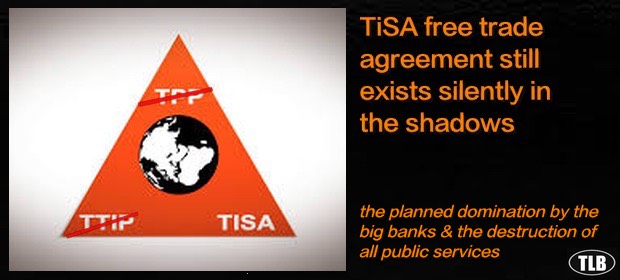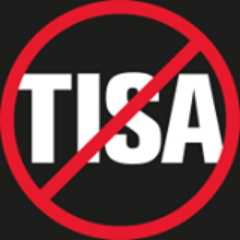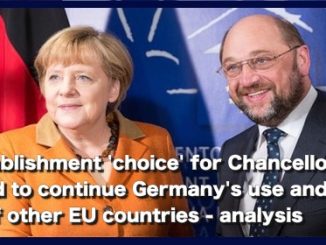
TPP is Not Dead: It’s Now Called the Trade In Services Agreement
PETE DOLACK
One can hear the cry ringing through the boardrooms of capital: “Free trade is dead! Long live free trade!”
Think the ideas behind the Trans-Pacific Partnership or the so-called “free trade” regime are buried? Sadly, no. Definitely, no. Some of the countries involved in negotiating the TPP seeking to find ways to resurrect it in some new form — but that isn’t the most distressing news. What’s worse is the TPP remains alive in a new form with even worse rules. Meet the Trade In Services Agreement, even more secret than the Trans-Pacific Partnership. And more dangerous.

The Trade In Services Agreement (TISA), currently being negotiated among 50 countries, if passed would prohibit regulations on the financial industry, eliminate laws to safeguard online or digital privacy, render illegal any “buy local” rules at any level of government, effectively dismantle any public advantages to be derived from state-owned enterprises, and eliminate net neutrality.
TISA negotiations began in April 2013 and have gone through 21 rounds. Silence has been the rule for these talks, and we only know what’s in it because of leaks, earlier ones published by WikiLeaks and now a new cache published by Bilaterals.org.
Earlier draft versions of TISA’s language would prohibit any restrictions on the size, expansion or entry of financial companies and a ban on new regulations, including a specific ban on any law that separates commercial and investment banking, such as the equivalent of the U.S. Glass-Steagall Act. It would also ban any restrictions on the transfer of any data collected, including across borders; place social security systems at risk of privatization or elimination; and put an end to Internet privacy and net neutrality. It hasn’t gotten any more acceptable.
TISA is the backup plan in case the TPP and the Transatlantic Trade and Investment Partnership don’t come to fruition. Perhaps fearful that the recent spotlight put on “free trade”  deals might derail TISA as it derailed TPP, the governmental trade offices negotiating it have not announced the next negotiating date. The closest toward any meaningful information found was the Australian government’s bland statement that the “Parties agreed to reconvene in 2017.”
deals might derail TISA as it derailed TPP, the governmental trade offices negotiating it have not announced the next negotiating date. The closest toward any meaningful information found was the Australian government’s bland statement that the “Parties agreed to reconvene in 2017.”
The cover story for why TISA is being negotiated is that it would uphold the right to hire the accountant or engineer of your choice, but in reality is intended to enable the financial industry and Internet companies to run roughshod over countries around the world. And while “liberalization” of professional services is being promoted, the definition of “services” is being expanded in order to stretch the category to encompass manufacturing. Deborah James of the Center for Economy and Policy Research laid out the breathtaking scope of this proposal:
“Corporations no longer consider setting up a plant and producing goods to be simply ‘manufacturing goods.’ This activity is now is broken down into research and development services, design services, legal services, real estate services, architecture services, engineering services, construction services, energy services, employment contracting services, consulting services, manufacturing services, adult education services, payroll services, maintenance services, refuse disposal services, warehousing services, data management services, telecommunications services, audiovisual services, banking services, accounting services, insurance services, transportation services, distribution services, marketing services, retail services, postal and expedited delivery services, and after-sales servicing, to name a few. Going further, a shoe or watch that measures steps or sleep could be a fitness monitoring service, not a good. A driverless car could be a transport service, not an automobile. Google and Facebook could be information services and communication services, respectively.”
Why is it you are kept in the dark?
Before we get to the details of the text itself, let’s take a quick look at how the world’s governments, on behalf of multi-national capital, are letting their citizens know what they are up to. Or, to be more accurate, what they are not telling you. Many governments have not bothered to update their official pages extolling TISA in months.
The European Union is negotiating TISA on behalf of its 28 member countries, along with, among others, the United States, Canada, Mexico, Australia, New Zealand, Japan, South Korea, Taiwan, Chile, Colombia, Peru, Norway, Switzerland, Pakistan and Turkey.
In the United States, the new Trump administration has yet to say a word about it. The Office of the U.S. Trade Representative web site’s page on TISA still says “TiSA is part of the Obama Administration’s ongoing effort to create economic opportunity for U.S. workers and businesses by expanding trade opportunities.” Uh-huh. President Donald Trump is not against “free trade” deals; he simply claims he can do it better. The Trump administration has issued blustery calls for “fair deals” and braggadocio puffing up Donald Trump’s supposed negotiating prowess. A typical White House passage reads, “To carry out his strategy, the President is appointing the toughest and smartest to his trade team, ensuring that Americans have the best negotiators possible. For too long, trade deals have been negotiated by, and for, members of the Washington establishment.”
More typical of the TISA negotiators is the latest report from the European Commission, which summarized the latest round, held last November, this way: “Parties made good progress in working towards an agreed text and finding pathways towards solving the most controversial outstanding issues at both Chief Negotiators and Heads of Delegation levels.” The Canadian government’s last update is from last June and declares “Parties conducted a stocktaking session to assess the level of progress on all issues.”
Traveling across the Pacific brings no more useful information. Australia’s government offers this information-free update: “Parties agreed to a comprehensive stocktake of the negotiations, identifying progress made and areas which require ongoing technical work.” New Zealand’s government can’t even be bothered to provide updates, instead offering only discredited, boilerplate public-relations puffery similar to other trade offices.
The one hint that TISA negotiations are experiencing difficulty that could be found through an extensive online search is this passage in a U.S. Congressional Research Service report dated January 3, 2017: “Recognizing that outstanding issues remain and the U.S. position under a new administration is unclear, the parties canceled the planned December 2016 meeting but are meeting to determine how best to move forward in 2017.” Given that the new administration is moving as fast as possible to eliminate the tepid Dodd-Frank Act financial-industry reforms, it would seem TISA’s provisions to dismantle financial regulation globally would not be a problem at all.
But that these talks are not progressing at the present time does not mean the world can relax. It took years of cross-border organizing and popular education to stop the TPP, and this effort will have to replicated if TISA is to be halted.
ER recommends other articles by CounterPunch
About the author
Pete Dolack writes the Systemic Disorder blog and has been an activist with several groups. His book, It’s Not Over: Learning From the Socialist Experiment, is available from Zero Books.
 Find out about our great (WOW) TLB Project Membership package and benefits, add your voice and help us to change the world!
Find out about our great (WOW) TLB Project Membership package and benefits, add your voice and help us to change the world!




